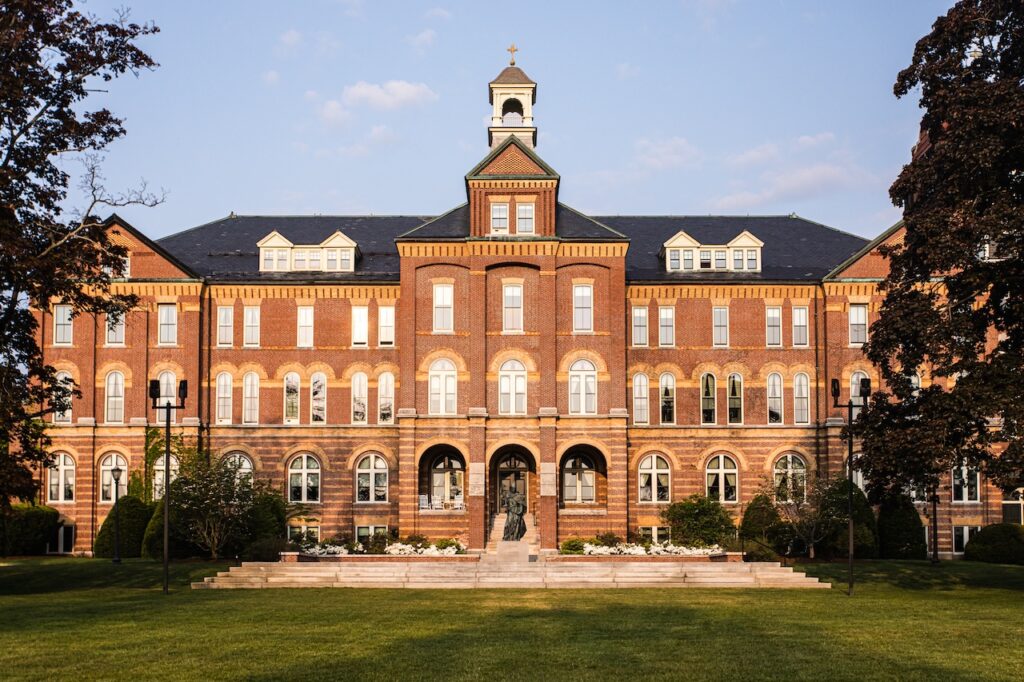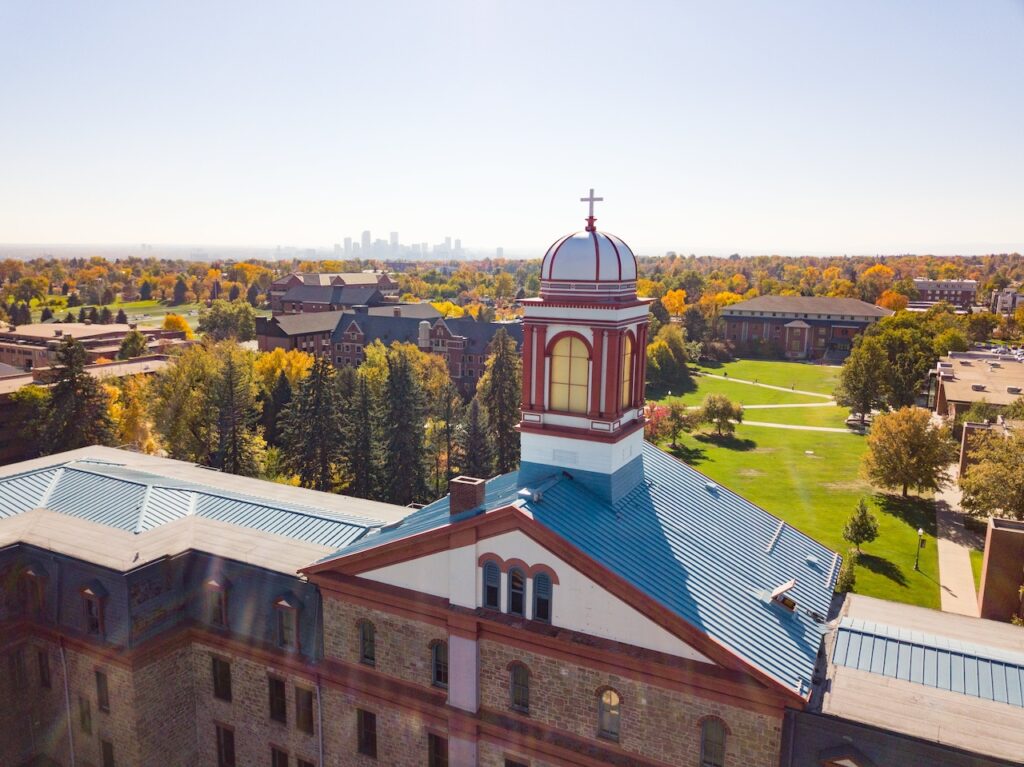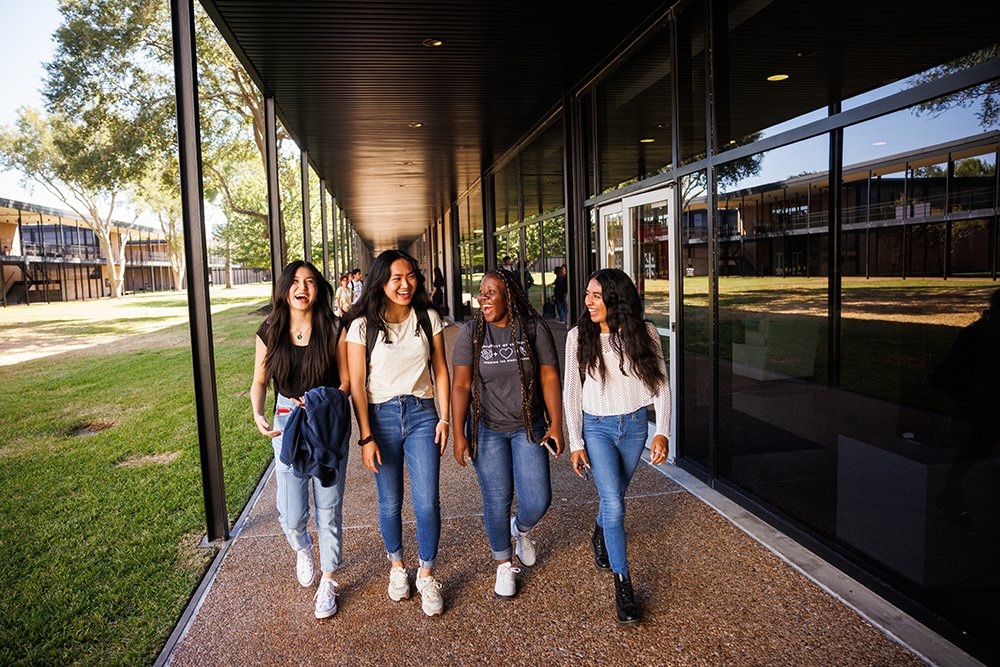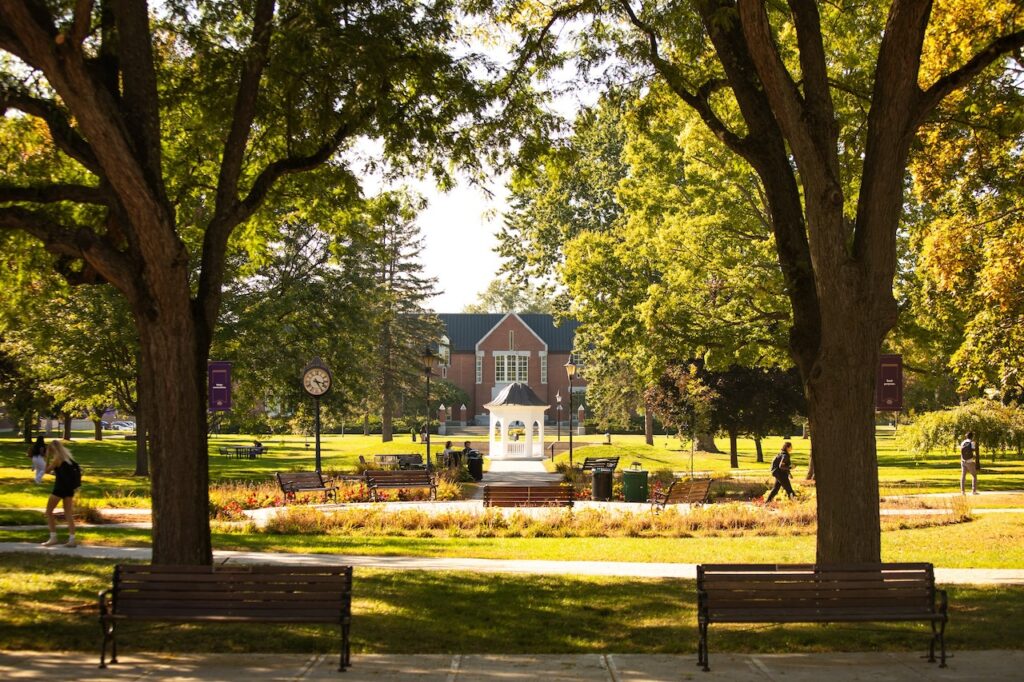(OSV News) — It’s often said that death and taxes are two of life’s most enduring certainties. To that duo, anxious parents of teenagers might add another: rising college tuition.
For high school students yearning to attend a Catholic college, there is an encouraging development: Many Catholic institutions of higher learning are increasingly committed to making academia accessible through free, full tuition programs.
“There’s probably a significant number of students who would be interested in St. Mike’s,” said Brigid Lawler, until recently the vice president for enrollment management at St. Michael’s College in Colchester, Vermont. “But they see that initial sticker price and think, ‘I’m not even going to have the conversation because I don’t think I can afford that.'”
With about 1,100 undergraduate students from 21 states and 15 countries, St. Michael’s College is the only Edmundite college in the world – founded in 1904 by the French order of priests known as the Society of St. Edmund.
Boasting more than 40 majors and a 10:1 student to faculty ratio, the college has a history of social justice commitment, with more than 70% of students participating in service opportunities.
For the 2025-2026 school year, tuition, food and housing at St. Michael’s College totals $70,990, excluding books, supplies and incidental costs. However, over 90% of its students receive financial aid – and “The St. Mike’s Community Commitment” gives families whose income falls at or below $100,000 a total aid package covering full tuition after federal grants. In addition, all admitted students are automatically considered for merit-based scholarships.
Because the St. Mike’s Community Commitment launched in late 2024, it’s still difficult to judge the impact of the new financial aid program. But Lawler is both enthusiastic and emphatic.
“We are a campus that has this very strong sense of community, and there is this idea that we want to take care of the folks that are here and help them to stay,” she said, “because we all know that should be a huge part of the mission.”
St. Anselm College in Manchester, New Hampshire, launched its Anselmian Community Commitment in 2024, “a program that allows New Hampshire students with a family income of $100,000 or less and a GPA of 3.25 or higher to attend the college tuition-free,” according to its website, with school leaders citing the school’s Catholic and Benedictine mission.

Also in 2024, College of the Holy Cross in Worcester, Massachusetts, also announced that students whose families have a total income of $100,000 or less “and reasonable assets” will receive a full tuition grant. The move was an expansion of the school’s current financial aid program, which in the 2022-2023 academic year stated that families with a total income of $75,000 or less were eligible for the full tuition coverage.
At Regis University in Denver, undergraduate students in 2025-2026 can expect to pay $47,490, excluding fees and living expenses. However, all first-year students received financial aid in 2023-2024.
“We strive to continue to evolve each year and meet students where they are,” said Catherine Rohde, assistant vice president of Financial Aid and Scholarships.
“We know how transformative a Jesuit Catholic education is, and we hope that these initiatives, including ‘Road to Regis,’ build awareness and excitement about the possibility of attending Regis University,” she continued. “While specific financial aid strategies may shift, especially in light of federal and state budget conversations, our goal of partnering with families to provide support stays the same.”
Unveiled in Oct. 2024, the “Road to Regis” program – through federal, state and Regis funding – provides a financial aid offer of full tuition for up to four years for eligible traditional first-year or transfer college students.

Rohde explained the funding mix that enables Regis to assist students.
“Although we are a private institution, we rely on federal grants and campus-based funding, and we are incredibly thankful for the grant support from the Colorado Department of Higher Education that we receive for our Colorado Residents pursuing a Jesuit Catholic education,” she said.
“Like other financial aid opportunities, we utilize federal and state grant allocations, but we also optimize institutional dollars. Most are unfunded tuition discount incentives, in order to help, particularly our financially neediest families,” Rohde added. “While our endowment dollars are a piece of the puzzle, many endowments are geared towards specific students or programs, per donor wishes. Therefore, these endowments, while critical for our overall budget conversations, do not directly correlate to our Road to Regis offer.”
As the only Jesuit Catholic university in the Rocky Mountain region, Regis offers 83 degree programs to 5,754 enrolled students, with a 9:1 student to faculty ratio. Designated as a Hispanic Serving Institution – 39% of full-time undergraduates identify as Hispanic – Regis is also moving toward becoming a bilingual campus.
According to the Association of Catholic Colleges and Universities, “On average, the published tuition at a Catholic college or university was $37,500 in 2023-2024, according to the National Center for Education Statistics. After financial aid, the average net tuition is $25,220.”
ACCU additionally reports that “84% of students enrolled at Catholic institutions receive any kind of financial aid, with an average amount of $23,771 per student in 2022-2023. Over 91% of students at Catholic institutions received institutional aid.”
There are 230 Catholic colleges and universities in the U.S. – distributed throughout 40 states, the District of Columbia and Puerto Rico – attended by some 675,000 students as of fall 2023. In the United States, Catholic schools founded by the Dominican, Franciscan, and Jesuit orders dominate the higher education field.
“A lot of times, students never even considered us because we are a private university and they just automatically think, ‘Unaffordable; expensive; can’t do it,'” said Lynda McKendree, dean of scholarships and financial aid at the University of St. Thomas in Houston.

“So when we started getting more information about why maybe some of the Catholic students in our community weren’t looking at our school, that was the reason,” she explained. “And we knew that some of these families would qualify for very strong financial aid packages.”
Tuition and fees are $35,754 before scholarships and financial aid, but more than 85% of new freshmen – both domestic and international – receive a University of St. Thomas scholarship upon enrolling.
“The St. Thomas Promise” – launched three years ago, with approximately 6% of the student body benefitting – also offers help to prospective scholars.
“If you have a 3.4 or higher high school GPA – and if your family income is $50,000 or less – you qualify for the St. Thomas promise,” said McKendree. “And that is free tuition and fees for four years.”
Founded in 1947 by the Basilian Fathers – a congregation launched in France in the wake of the French Revolution – the University of St. Thomas provides more than 40 undergraduate majors and 30 graduate degrees to 3,600 students, offering a 13:1 faculty to student ratio.
“One thing that’s at the core of our mission at the University of St. Thomas is being able to bring students into that awareness of what is the Catholic university,” said Sara Nevares Johnson, the university’s dean of admissions.
Nevares Johnson said that both the values of “Ex Corde Ecclesiae” – an apostolic constitution issued in 1990 by St. John Paul II regarding Catholic colleges and universities – and the Basilian Fathers’ charism of “goodness, discipline and knowledge” contribute to student formation.
“We bring that into the conversation not only in the classroom, but before they even enter the classroom,” Nevares Johnson said. “When we’re outreaching and recruiting students and families, we’re talking about what it means to grow and thrive in a university community at the University of St. Thomas.”

